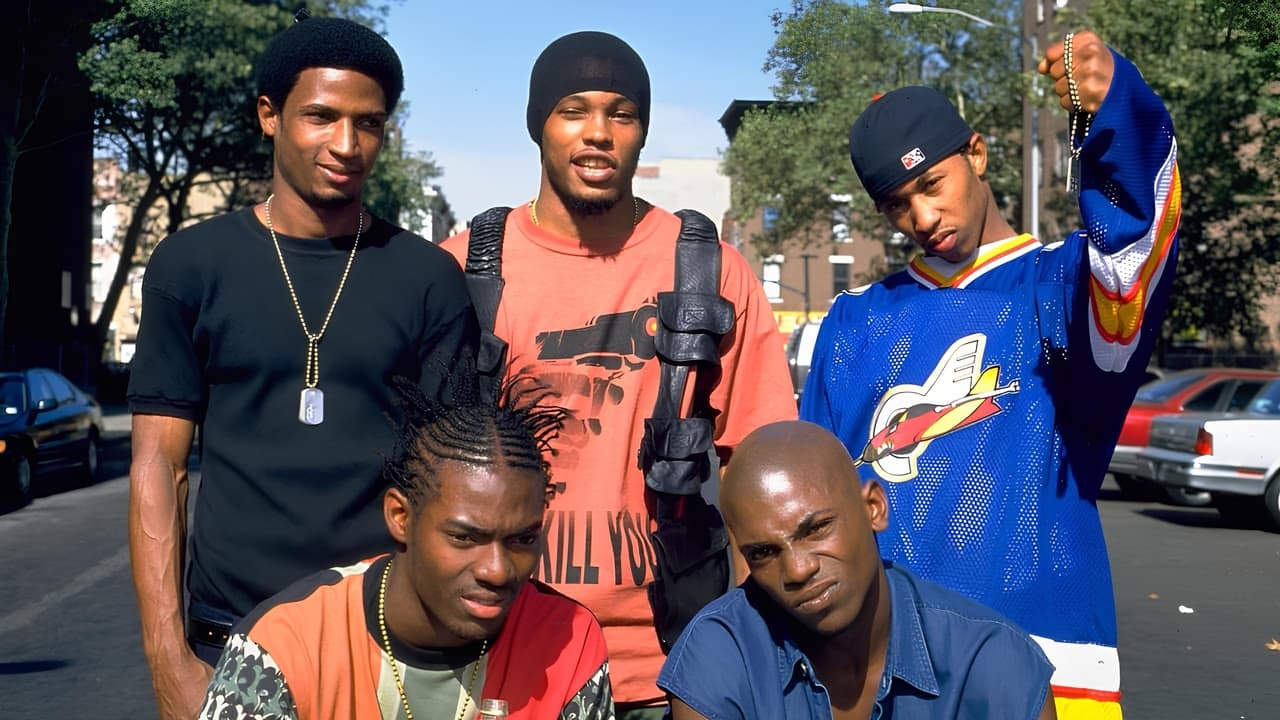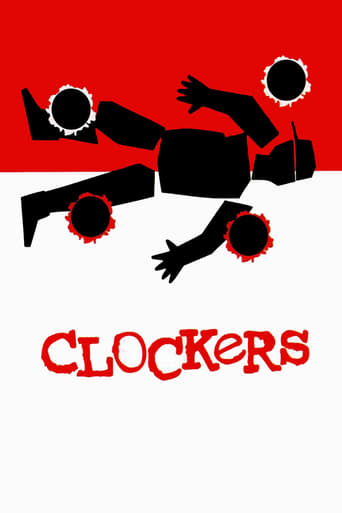

Martin Scorcese was originally scheduled to direct Clockers, would he have done a better job than Spike Lee ? Did the latter lack ambition or should the novel be blamed for being not catchy enough ? Those are a few questions emerging after finishing this movie.Because if the story is rather interesting and carried by good cast (though under-exploited), it lacks intensity in order to really implicate the viewer. The scenes follow each other in a certain monotony and shallowness inevitably prejudicial, and the dramatic progression is extremely weak, not to say almost non-existent. Therefore, you're never captivate by this chronicle and the overlong passages don't help either. One could also regret an editing a bit sloppy with flashbacks and others not that pertinent.Anyway, in the ghetto movie genre, others have depicted much better, and with a lot more grip, the everyday life of these neighbourhoods, like Menace II Society for example.
... View MoreDope dealing on the Nelson Mandela projects in Brooklyn is the everyday bread of local hoodlum Ronald Dunham aka Strike (Mekhi Phifer). Staking the local park the line of work is relentlessly stressful causing a stress-induced ulcer, which he deals with by drinking down yoo-hoos by the litres. At night respite is found in the form of a trainset hobby, an voyeuristic escape from the reality he has accepted. When his boss Rodney Little (Delroy Lindo) hints towards the necessity of cropping one of his less trustworthy workers Strike confides to his brother Victor (Isaiah Washington). Soon after the murder is committed and Victor steps up to claim self defence. However hardliner detective Rocco Klein (Harvey Keitel) quickly assumes this is a cover up for the true culprit.One of Spike Lee's most accomplished works and a worryingly underrated gem bordering on a masterpiece. While showing artistic restraint in symbols and style, Spike Lee offers a well-devised structure, which lets the strength of the story carry itself. Especially in the final act Lee's well-tuned reserve makes for a heart-felt conclusion full of poignant suggestions, as to the nature of violence. Even the innocent can be corrupted needing a vent for their endless victimisation, while the corrupt seek innocence by befriending children reminiscent of them in their youth and dreaming about a life with 'no more packing'. The ultimately compassionate Rocco, previously shown as a no nonsense cop with a strong moral compass ultimately rejects 'Justice in Black and White', deciding that even the guilty are seldom dealt justice and takes on the role of a benevolent judge and jury - the antithesis of Dirty Harry and Judge Dredd, one more attuned to understand human faults, accept them, than issue warrants. Nonetheless this self-conscious style of storytelling does backlash during build-up, as the convoluted plot mires midway with mild bouts of oversentimentilisation and underwritten character motivations, before finally hitting back with an astoundingly well-rounded finale. Nonetheless a brilliant and captivating movie, which ranks up there with Spike Lee's best with high probability of future rewatching pleasure. A big part of the success comes from disposing of the preacher like stance so predominant in many of Lee's weaker works.Albeit mostly low-key and pretty standard the most significant scenes feature sudden detachment from traditional cinematography to a more detached, surreal focus, as if suggesting a detachment from the grim everyday reality of the protagonists offering escapist release from hardships. This offers some extremely imaginative cinematography by Malik Hassan Sayeed.
... View MoreAlthough I have only seen a few of Spike Lee's films, I am already beginning to place him very low on the ladder of the best directors alive today. Clockers fails, in my opinion, because the film's premise is lacking substance to begin with; the story is lackluster to the max. On top of this, where the film had its opportunities to reel in the audience emotionally, it instead dropped the ball. Moments where energy, tension, and suspense were supposed to effused were disappointingly overridden with anticlimactic slumps in action. The choking scene in the car as well as when Mekhi is being beat up in the park, with their odd selection of music, seem unfulfilled in their potential to capitalize on emotional appeal.I will say the denouement is shot with expert precision. Lee's patented cinematographic maneuver, the double dolly, is on full display. Moreover, his use of low-key lighting in some specific scenes that illustrate the proliferation of drugs inside the projects are done in a professionally haunting manor. Unfortunately, these instances are rare, overshadowed by the weak portions previously discussed.With regards to Lee's film style in Clockers, I like to point out two of his techniques that I find terribly annoying: 1) Those stupid circling gliding shots around characters when they are talking. 2) His persistent use of intense music to compliment serious(at least Lee thinks they must be) scenes. When put together, these two devices serve to create the ultimate exaggeration of the weight a scene carries in this film. Doing a flashy gliding pan across the park accompanied by pounding sound while Tyrone's mother yells at Mekhi and his boys about his haircut is a little excessive. Instead, I think Clocker's would benefit from a greater variation in the levels of stress and emotion we experience in each scene. This way, when the film actually does come to a TRULY significant moment, the audience will become more invested in the action.P.S. I don't think anyone from the projects would actually where a complete Arizona wildcats uniform. Just the jersey, not the shorts.
... View MoreTake a murder mystery story, mix it into a contemporary vulgar urban setting, then sprinkle some racial tension into the mix and you've got the highly intellectual and intense Spike Lee film Clockers. Clockers is about Strike, a young black man living in Brooklyn, dealing drugs for his ruthless drug lord Rodney Little. Strike deals drugs for the money, but all he really wants to do is hang out with his brothers in the park and play with model train sets. But things start to get rough when a night manager at a local fast food joint is murdered and Strike's brother Victor turns himself in. Det. Rocco Klein is the lead detective on the case and he doesn't buy Victor's story, which sets him on an obsessive hunt to unmask the truth behind this whole ordeal. The film is loaded with spirited yet vulgar dialouge, artistic and vibrant direction, and plenty of memorable characters. Clockers is witty, intelligent, and a lot of fun. It isn't your typical murder mystery or racial tension film. It is a beautiful blend of the two genres that turns into something very unique and very exciting.Spike Lee adds a lot of visual flair to this film and the way he directs it is something you can't quite pinpoint. The panoramic visual style is something you can't exactly describe in words and it is really something you have to see for yourself. There is something obviously unique going on in the way Lee directs this film, it is just difficult to articulate what exactly that is. But the visuals do work in a whole plethora of unique films, allowing the film to succeed on multiple levels. The film ranges from intense and gripping to quirky and fun. From one scene to the next the film grows more fun and more enthralling. Rarely do I care this much about what happens to the characters of a film and I'm not always so compelled to learn the motivations of the very well written characters of a film.All that being said I can't say that I loved the main character, Strike. The actor, Mekhi Phifer, wasn't great and the character himself had some odd moments. I eventually learned to like him and his character thankfully didn't deter too much from my liking of the film. Besides, a lot of the film actually focuses on Harvey Keitel's character and his unending search for the truth behind the murder. There are also numerous subplots that all end up being more interesting than the main character's story. It helps that this is just an all around well written film that is just smarter than your average crime film.Clockers is very different from any murder mystery crime film, as well as any racial tension film. But it provides plenty of great work on both sides of this spectrum. Spike Lee has created a visually interesting film with a fantastic story. The main character is the only low point of the film, but everything else is very good. Clockers is a very worthwhile watch for fans of Spike Lee or the multiple genres this film spans.
... View More